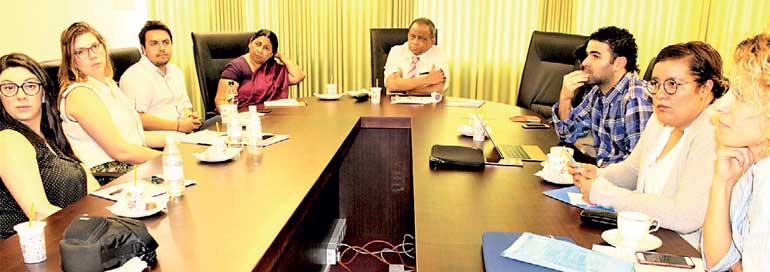Sunday Feb 22, 2026
Sunday Feb 22, 2026
Thursday, 23 November 2017 00:00 - - {{hitsCtrl.values.hits}}


As part of an initiative by USAID and Common Grounds, a delegation from Columbia comprising 11 members visited the Ministry of National Integration and Reconciliation on 21 November to draw knowledge, expertise and experiences on the reconciliation and integration efforts of the Sri Lankan Government.
Ministry of National Integration and Reconciliation Secretary V. Sivagnanasothy spoke about national reconciliation and integration strategy of Sri Lanka, which included the integration friendly schools program, reconciliation friendly media, integration friendly university and youth corps, inculcating integration concepts into Sunday religious school teaching, curriculum development in school education incorporating ethics, values, virtues and comparative religious studies.
Further, he mentioned the Reconciliation Focused Economic Empowerment Project (REEP), 50,000 housing program, roads project and social and economic infrastructure projects that will help to reduce economic disparities and enhance trust.
Sivagnanasothy also stated that District Reconciliation Committees (DRC) have been established together with President Maithripala Sirisena’s guidance to address ethnic and religious tension in hotspots. Considerable progress has now been made in the operationalisation of OMP which comes under the purview of the Ministry of National Integration and Reconciliation.
The delegation voiced its approval and commendation on the projects and applauded the holistic approach adopted by Sri Lanka in working towards sustainable peace.
Andres Guevara, an Editor from a Columbian magazine, commended the reconciliation-friendly media programs in place in Sri Lanka and launched a discussion with regards to the media’s role in sustainable peace. The discussion noted that it was not about censoring or controlling the free media but rather fostering an alternative message to limit the spreading of tensions and animosity among the masses. The issue of fake news came up, thus further strengthening the need for reconciliation-friendly media programs and awareness initiatives to establish a more harmonious country.
Search for Common Ground international representative Laura Ochoa shared the experiences of current Colombian reconciliation projects. She explained that conflict-affected areas need to be provided with basic economic and social infrastructure including resettlement and rehabilitation, livelihood and economic empowerment to address disparities and need reparation support.
It was noted that the priority was also to provide physical rehabilitation for disabled persons and extend psycho-social support to affected persons, including families of missing persons, to overcome trauma. Further, sustainable social reintegration of ex-combatants into communities and providing economic opportunities to prevent future recurrences was vital.
Rocio Guitterrez, the Secretary of Peace, and the other delegates reiterated their commendation of the peace education program for children which they said has tremendous potential for success in terms of establishing sustainable peace. Those who were in attendance agreed about the importance of the involvement and empowerment of youth and further shared the various projects in place that get the youth engaged in shaping future of Sri Lanka. The Colombian Peace Agreement was brought up and its strengths and weaknesses were discussed.
The meeting was attended by both local and international representatives of Search for Common Ground - Laura Ochoa and Dayani Panagoda. Also in attendance were Rocio, Maria Jose, Estefonia Guesta, Fady Villegas, Milena Peralta, Edna Katalina and Favea Harquez who represented various other prominent peace agencies and governmental institutions from Colombia.